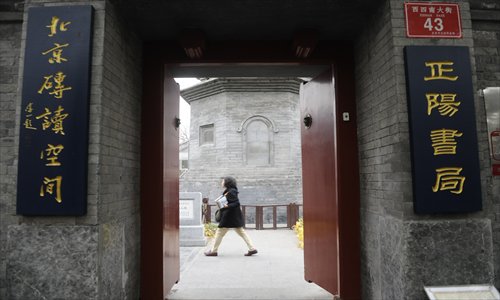

The entrance to Zhengyang Bookstore,the first government-sponsored privately-run reading space in Xicheng district. Photo: Li Hao/GT
Overlooking the historic Pagoda of Old Man Wansong in Beijing's Xicheng district is an unassuming bookshop that local administrators are hoping will breathe new life into an increasingly neglected pastime.
"I love reading here," said 27-year-old Zhang Xu, a communications company employee who has frequented Zhengyang Bookstore five times since its opening. "Seeing the old pagoda, the traditional courtyard, and reading books about Beijing, it's a peaceful space that allows me to contemplate the forgotten history of this place," said Zhang.
Founded in April, Zhengyang Bookstore is one of two government-sponsored reading spaces established this year as part of a novel approach that combines public initiative and private enterprise with the aim of promoting reading among the public. Although the picturesque premises and some of the 40,000 odd books that stock the bookshop's shelves were bought using public funds, the bookstore is privately-owned and run, with pricing structures and approaches for luring readers determined by the owner.
"I was given the space for free, but the cost of renovation fell to me," said 31-year-old owner Cui Yong, who was given the opportunity to develop the site after his proposal, which is focused around books that cover various aspects of life in Beijing, was chosen by local authorities from a number of competing bids.
In addition to its inventory of Beijing books, Cui runs regular seminars about Beijing culture. Patrons can purchase the books in the shop, or lend them out by signing up to an annual membership for 30 yuan ($4.90).
"We have around 3,000 members at the moment," said Cui. "On average, a few hundred people come into the bookshop each day. The most we've ever had is around 1,500 on one day."
In September, a second government-sponsored reading space was opened, called My Second Study. Located in Jinzhongdu Park, the premises was again provided for free by local authorities, along with a 400,000 yuan grant for books.
"I think that the habit of reading is acquired from childhood, which is why My Second Study is focused on books that parents and children can read together, along with related public events that encourage children to read," said Li Yan, the bookshop's owner.
Li, who runs a number of libraries in other provinces in China, said that the combination of public funding with private enterprise allowed bookshop and library owners to cater to a more specific audience.
"Public libraries which are free are unable to cater to a niche audience," said Li. Membership fees to Li's library will be subsidized by the government, but with a base rate of 1,800 yuan per year. My Second Study has already raised concerns that it defeats the purpose of the initiative.
"Public libraries should be free, whether they are privately operated or run by the government," said Chen Shaofeng, deputy dean of the Institute for Cultural Industries at Peking University. "The government should give greater subsidies to the private enterprises they are endorsing to manage the reading spaces, so services can remain free. Otherwise, little good will come of it, because very few people are willing to pay for reading services that are supposed to be public."
Chen said that there was potential in the idea of privately-run public reading spaces, but that the way the initiative was currently being managed was ill-conceived. Regarding both The Second Study and Zhengyang Bookstore, Chen questioned the viability of only stocking children's books in the former and books about Beijing in the latter. "Libraries need to continually adapt to meet the reading habits of people at any particular moment in time."
"It is not enough to simply combine government sponsorship with private operation," Chen said. "It is a good idea to promote public reading by building privately-run public reading spaces, but whether they will work remains to be seen."
Copyright ©1999-2018
Chinanews.com. All rights reserved.
Reproduction in whole or in part without permission is prohibited.